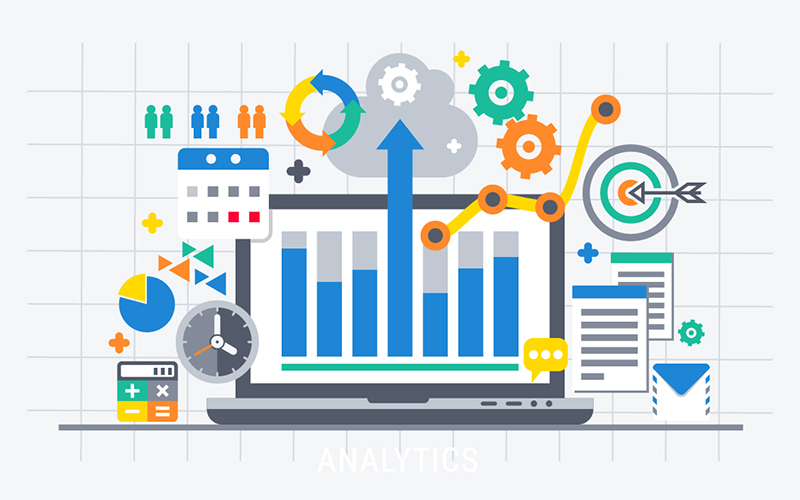Web & Social Analytics
The benefits of data analytics in healthcare
The healthcare industry generates an enormous amount of data. But data holds limited value till it is refined and analysed by healthcare officials and experts to make sustainable predictions. The outbreak of COVID-19 underlined the importance of big data and analytics in healthcare. It drew attention to various forms of healthcare analyses, including risk assessment analytics, operational analytics, and predictive analytics. Today, healthcare data analytics has become crucial. With an increasing demand for big data and advancements in healthcare-related technology, the global healthcare analytics market is expected to grow at a CAGR of 25.24% from 2022 to 2030.
What is healthcare data analytics?
Analytics is becoming increasingly prevalent within the healthcare industry to consolidate and analyse data - such as patient records, disease symptoms, drug interactions, and medical techniques - to help healthcare experts make more educated decisions concerning their patients. With right implementation, analytics can forecast outbreaks, strengthen preventive care, and enhance the overall quality of healthcare while reducing associated costs.
Use cases of data science in healthcare
Various forms of health-related data — such as electronic health records (EHRs), genomics, bioinformatics, medical imaging, and medical informatics — are combined with data analytics in healthcare settings and medical departments. One can employ healthcare data analytics to study past, current, and future patterns through one of the following techniques:
Descriptive analytics:
Descriptive analytics helps understand historical patient data to compare and discover trends across various aspects of healthcare. This analysis relies heavily on past data and patterns and provides substantial insights into existing and persisting health concerns that have been around for a long time.Predictive analytics:
Predictive analytics uses both historical and current patient data to predict future outcomes. This type of healthcare analysis helps forecast future patterns in various segments of medical research.Prescriptive analytics:
Prescriptive analytics also forecasts future trends and possibilities and suggests new strategies to deal with them. Machine learning is one of the central factors in this analysis, which determines the ideal course of action for the best possible outcomes.Discovery analytics:
Discovery analytics uses sophisticated software along with historical data and forecasts to develop potential new healthcare solutions, including developing new drugs, analysing new diseases or disorders, and hypothesising alternative medical strategies for treatment.
The benefits of data analytics in healthcare
Healthcare data analytics is a promising tool in the advancement of medical research. It can tremendously improve the ability of health organisations to predict and overcome potential obstacles, such as outbreaks of diseases, as well as aid in developing preventative care. The benefits of data analytics in healthcare are realised on the following fronts:
- Support easier collaboration and sharing of healthcare data among physicians and healthcare organisations for quick and improved clinical treatment decisions.
- Offer better insights into the health reports of individual patients for early detection of diseases and accurate risk management.
- Facilitate real-time forecasts and preventative measures to make healthcare more efficient for both doctors and patients.
- Provide real-time insights to physicians and doctors by analysing data at the collection point.
- Assist healthcare professionals in responding accurately to fluctuating healthcare environments while lowering costs.
The future of healthcare data analytics
Healthcare data analysis in combination with artificial intelligence (AI) will be a significant disruptor in the healthcare industry in the coming years. AI-powered analytics will deliver a new wave of innovation with patient-centric metrics and make clinical decisions more accurate. With the help of AI and data science in healthcare, patients with similar profiles can be categorised for predicting health trends. These predictions will help hospitals and clinics prepare better for drug studies and interactions. Moreover, doctors and physicians will be able to make more informed decisions with the aid of real-time analytics in healthcare and suggest medicines, tests, and treatments to their patients at lower costs.
For organisations on the digital transformation journey, agility is key in responding to a rapidly changing technology and business landscape. Now more than ever, it is crucial to deliver and exceed on organisational expectations with a robust digital mindset backed by innovation. Enabling businesses to sense, learn, respond, and evolve like a living organism, will be imperative for business excellence going forward. A comprehensive, yet modular suite of services is doing exactly that. Equipping organisations with intuitive decision-making automatically at scale, actionable insights based on real-time solutions, anytime/anywhere experience, and in-depth data visibility across functions leading to hyper-productivity, Live Enterprise is building connected organisations that are innovating collaboratively for the future.
How Infosys BPM can help?
Infosys BPM web and social media analytics solutions incorporate tools such as machine learning, AI, and intelligent hyper-automation to provide actionable insights into your healthcare company’s business-critical parameters and key factors influencing non-linear customer journey paths. Our deep-domain expertise combined with our cutting-edge technology can offer accurate real-time analytics in healthcare that can help overcome your business challenges and drive your organization’s revenue and profitability.






